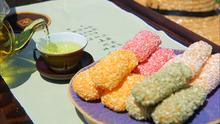 Colorful gangjeong (sweet rice puffs) with nokcha (green tea) | |
| Type | Yugwa |
|---|---|
| Place of origin | Korea |
| Main ingredients | Glutinous rice flour; cheongju (rice wine); cooking oil; honey; beans, nuts, seeds, pollen, or spice powders |
| Korean name | |
| Hangul | 강정 |
|---|---|
| Revised Romanization | gangjeong |
| McCune–Reischauer | kangjǒng |
| IPA | [kaŋ.dʑʌŋ] |
Gangjeong (강정) is a hangwa (한과, traditional Korean confection) made with glutinous rice flour. It is a deep-fried "rice puff" with hollow inside, coated with honey followed by nutty beans, nuts, seeds, pollen, or spice powders.[1][2] Gangjeong is often served during important events such as weddings, ancestral rites, and Korean New Year celebrations.[3]
Preparation
Glutinous rice is soaked in water for four to five days, then pounded or ground into fine powder.[2] Ten cups of glutinous rice flour is mixed with half cup cheongju (rice wine) and half cup honey, and steamed in siru (steamer) lined with wet bojagi (cloth).[2] Steamed dough is kneaded, rolled into 1 centimetre (0.39 in) thick sheets, cut into 3–4 centimetres (1.2–1.6 in) long and 1.5–2 centimetres (0.59–0.79 in) wide rectangles, and dried in shade.[2][4] Well-dried gangjeong is first soaked in room-temperature cooking oil, then let rise a little more in warm oil, and deep-fried at a high temperature.[2] When all excess oil is drained, the rice puff is coated with honey followed by nutty grains or powders such as toasted sesame seeds, pine nut powder, soybean powder, pine pollen, angelica leaf powder, and cinnamon powder.[1][2]
See also
- Yugwa
- Yeotgangjeong
References
- ^ a b "gangjeong" 강정. Standard Korean Language Dictionary (in Korean). National Institute of Korean Language. Retrieved 24 April 2017.
- ^ a b c d e f "gangjeong" 강정 [Deep-fried Sweet Rice Puffs]. Doopedia (in Korean). Doosan Corporation. Retrieved 24 April 2017.
- ^ National Institute of Korean Language (2002). An Illustrated Guide to Korean Culture: 233 Traditional Key Words. Seoul: Hakgojae. pp. 112–113. ISBN 9788985846981.
- ^ "Hangwa". Korean Food Foundation. Retrieved 24 April 2017.



